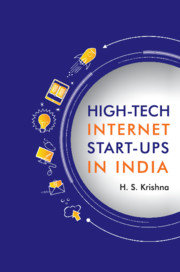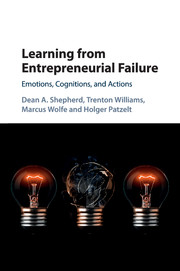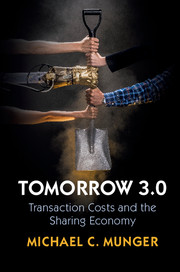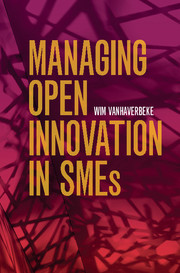Building Technology Transfer within Research Universities
An Entrepreneurial Approach
£36.99
- Editors:
- Thomas J. Allen, Massachusetts Institute of Technology
- Rory P. O'Shea, Massachusetts Institute of Technology
- Date Published: October 2020
- availability: Available
- format: Paperback
- isbn: 9781108931045
£
36.99
Paperback
Other available formats:
Hardback, eBook
Looking for an inspection copy?
This title is not currently available on inspection
-
For the past number of years, academic entrepreneurship has become one of the most widely studied topics in the entrepreneurship literature. Yet, despite all the research that has been conducted to date, there has not been a systematic attempt to analyze critically the factors which lie behind successful business spin-offs from university research. In this book, a group of academic thought-leaders in the field of technology transfer examine a number of areas critical to the promotion of start-ups on campus. Through a series of case studies, they examine current policies, structures, program initiatives and practices of fourteen international universities to develop a theory of successful academic entrepreneurship, with the aim of helping other universities to enhance the quality of their university transfer programs. This book is a valuable resource for university research administrators, technology transfer office professionals, academic entrepreneurs, incubator management officials, R&D managers, venture capitalists, researchers, policymakers, and others involved in the commercialization of intellectual property.
Read more- This is the first systematic attempt to analyze critically the factors which lie behind successful business spin-offs from university research
- Provides readers with a coherent framework for understanding the factors driving the entrepreneurial behaviour inside universities; analyzes how university strategy, structures and reward systems can be designed to foster university entrepreneurship; and describes and assesses a range of entrepreneurial programs and leadership initiatives used to promote creation of start-ups on campus
- Data are presented in a readable and understandable format - results are both quantitative and qualitative without imposing on the reader a requirement for understanding complex mathematical models
Reviews & endorsements
'This volume brings alive the modern synthesis of entrepreneurship and universities that has created a powerful force for change and wealth in societies. The contributors are at the forefront of the subject and leaders everywhere will need to understand the insights discussed.' Phillip A. Sharp, Nobel Laureate in Medicine, Massachusetts Institute of Technology, and co-founder, Biogen Idec, Alnylam
See more reviews'This book is a must-read for scholars, practitioners and policymakers who want to really understand the emergence of technology-based start-up companies from academic institutions around the world. Edited by two of the leading researchers on academic entrepreneurship and with chapters from many other experts in the field, the book is unique in its coverage of universities from around the globe and for opening up the black box of the university practices that actually contribute to the formation of spin-off companies.' Toby Stuart, Chair of Entrepreneurship, Hass School of Business, University of California, Berkeley
'This edited volume by Allen and O'Shea provides excellent insight into the academic spin-off phenomenon by detailing the institutional development of a range of research university efforts in this vitally important means of technology transfer.' David H. Hsu, Associate Professor of Management, Wharton School, University of Pennsylvania
'While technology transfer from the university to industry is critical to economic growth and competitiveness, our commensurate understanding thereof is quite limited. Using an entrepreneurial lens, Allen and O'Shea [have] edited an important volume that opens the black box of technology transfer by studying leading research institutions across the globe. This book is a must-read for any policy maker, university administrator, academic, and student interested in technology transfer, innovation, and economic growth.' Frank T. Rothaermel, Deedy Professor, Georgia Institute of Technology
Customer reviews
Not yet reviewed
Be the first to review
Review was not posted due to profanity
×Product details
- Date Published: October 2020
- format: Paperback
- isbn: 9781108931045
- length: 413 pages
- dimensions: 230 x 150 x 25 mm
- weight: 0.6kg
- contains: 32 b/w illus. 42 tables
- availability: Available
Table of Contents
Foreword 1 Edward B. Roberts
Foreword 2 Donald Siegel
Acknowledgments
1. Introduction Thomas J. Allen and Rory O'Shea
2. The second academic revolution: the rise of the entrepreneurial university and impetuses to firm foundation Henry Etzkowitz
3. University-based entrepreneurship: a literature review Rory O'Shea, Ciara Fitzgerald, Harveen Chugh and Thomas J. Allen
4. Creating the entrepreneurial university: an analysis of the development of the MIT entrepreneurial ecosystem Rory O'Shea, Elliot Fishman and Thomas J. Allen
5. Inventing the entrepreneurial university: Stanford and the co-evolution of Silicon Valley Timothy Lenoir
6. The partnership between entrepreneurial science and entrepreneurial business: a study of integrated development at UCSD and San Diego's high-tech economy Mary Walshok and Carolyn Lee
7. Knowledge for the world: a brief history of commercialization at Johns Hopkins University Maryann Feldman, Pierre Desrochers and Janet Bercovitz
8. From ivory tower to industrial promotion: the case of Yale University and the biotechnology cluster in New Haven Shiri Breznitz
9. Fostering cross-campus entrepreneurship - building technology transfer within UCD to create a start-up environment Colm O'Gorman and Frank Roche
10. Stimulating academic entrepreneurship and technology transfer: a study of King's College London commercialization strategies Mike Wright and Igor Filatotchev
11. KU Leuven: complementing inception dynamics with incubation practices Petra Andries, Bart Van Looy and Koenraad Debackere
12. Toward a 'Global Knowledge Enterprise': the entrepreneurial model of the national university of Singapore Poh-Kam Wong, Yuen-Ping Ho and Annette Singh
13. The path to the entrepreneurial university in China: a case study of Northeastern University, China Chunyan Zhou
14. Public research organizations as a base for high-tech entrepreneurship in Europe: the case of IMEC and INRIA Philippe Mustar, Mirjam Knockaert and Bart Clarysse
15. Conclusion: strategies for enhancement of academic entrepreneurship Rory O'Shea and Thomas J. Allen
Index.
Sorry, this resource is locked
Please register or sign in to request access. If you are having problems accessing these resources please email [email protected]
Register Sign in» Proceed
You are now leaving the Cambridge University Press website. Your eBook purchase and download will be completed by our partner www.ebooks.com. Please see the permission section of the www.ebooks.com catalogue page for details of the print & copy limits on our eBooks.
Continue ×Are you sure you want to delete your account?
This cannot be undone.
Thank you for your feedback which will help us improve our service.
If you requested a response, we will make sure to get back to you shortly.
×




